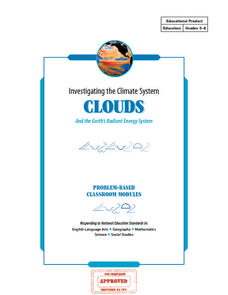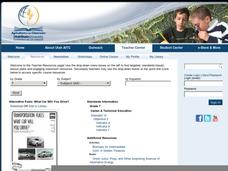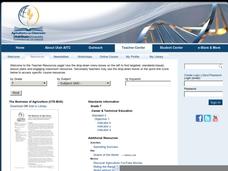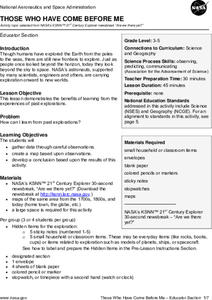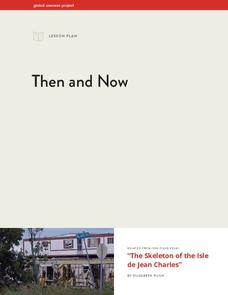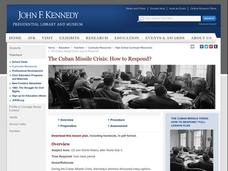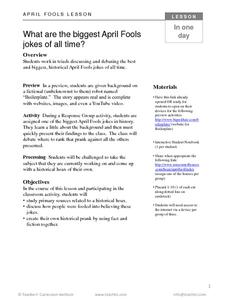iCivics
Step Eight: Positions, Please!
Everyone sees the results of public policy, but not everyone understands the strategy that goes into creating an effective one. Now that your class understands the brainstorming process from earlier in the series, they continue on to the...
Curated OER
Layer Cake Archaeology
Excavating cake? Why not! Kids spoon into some layers and artifacts during this tasty hands-on activity. The cake, a simulated archaeological dig, is the object of observation and discussion.
Children’s Hospital of Philadelphia
Case Study: The 1918 Influenza Pandemic – Factors Beyond the Biological that Influence the Spread of Disease
A very timely lesson looks at the social and political factors that affect the spread of disease. Using the 1918 Influenza Pandemic as a case study, pupils research factors that influenced the spread of the disease, including the role of...
Berkshire Museum
The Three Life-Giving Sisters: Plant Cultivation and Mohican Innovation
Children gain first-hand experience with Native American agriculture while investigating the life cycle of plants with this engaging experiment. Focusing on what the natives called the Three Sisters - corn, beans, and squash - young...
Montana State University
Everest Extremes: Biodiversity
How many animals can live in a climate as cold as Mount Everest's? Find out with a science lesson all about biodiversity. Activities include research, presentations, group work, coloring maps, and a simulation of a food web.
San Bernardino Co. Supt. of Schools
Was Julius Caesar a Good Leader for Rome?
Learners consider the various perspectives that different groups in Roman society may have had for Julius Caesar, such as Roman soldiers, senators, the working class, and slaves. The primary activity involves a reading of Caesar's...
Curated OER
The O Zone-Code Read Alert
What are the effects of an air quality alert? Expert groups receive one component of air quality information resources to study. Pupils then jigsaw into new groups and share their knowledge. Finally, they draft a statement of what they...
Curated OER
Investigating the Climate System - Clouds
Here is a fabulous lesson on the Earth's radiant energy system. This amazing, 31-page document is chock-full of great activities, worksheets, lab sheets, quizzes, rubrics, and assessments. Learners model and explain cloud formation,...
Curated OER
Hey - It's a Rainy Forest Out There!
Elementary schoolers take part in a very good lesson which has them watch video, conduct experiments, complete hands-on activities, and work in cooperative groups. The educationally-rich activities are clearly-explained, and the group...
Curated OER
Sustainability
Here is an in-depth, and incredibly thorough lesson plan on sustainable agricultural practices; specifically, regarding the growth of coffee. After completing and discussing a worksheet called "Thinking About Tomorrow," groups of...
Cornell University
Shedding a "Little" Light on Cancer Surgery
Many types of cancer treatments now depend on nanotechnology—a big "little" discovery. Scholars begin by removing "malignant" tissue from simulated brains, one using fluorescent markers thanks to nanotechnology and one without. This...
Curated OER
Transportation Fuels: What Car Will You Drive?
How many different types of biofuels are out there? Seventh graders watch a series of videos and participate in a series of activities in order to better understand all the transportation options available. They consider what type of car...
Curated OER
From Past to Present
Here is an impressive lesson on how agricultural practices and technology have advanced over time. Thoughtful discussion topics, good warm up activities, and fine worksheets are all embedded in this eight-page plan. The plan comes from...
Curated OER
The Business of Agriculture
Learners explore the importance of agribusiness in the US economy. They play one game where they sort and discuss the importance of agricultural commodities. They also play the game Pit to better understand how agricultural products are...
Curated OER
From Genes to Jeans
This unit of lessons is designed for 7th through 9th graders. They are introduced to the world of agriculture and the genetic research and various technologies that are associated with agriculture. Pupils work together to come up with a...
Museum of Tolerance
The Role of Citizens in a Participatory Democracy
Groups research participatory democracies and compare the role and rights of citizens in ancient history with those in recent U.S. history. Guided by a series of questions, individuals compose a persuasive essay in which they discuss the...
August House
The Archer and the Sun
Reinforce reading comprehension with a instructional activity about The Archer and the Sun, a Chinese folktale. Kids learn some background information about Chinese culture before reading the story, and answer literacy questions as they...
Curated OER
Those Who Have Come Before Me
Class members are transformed into explorers as they work in groups to locate hidden items and map their journey along the way. They then leave clues for other groups of students to follow, and ultimately discover how past explorations...
Global Oneness Project
Then and Now
The devastating changes happening to the Native American inhabitants of an island off the coast of Louisiana are the topic of an informational lesson. After scholars break into groups to explore particular topics, they come back together...
Chicago Botanic Garden
Faces of Climate Change
Sometimes, the best solution to a problem can be found by walking in someone else's shoes. Here, scholars use character cards to take on the roles of people around the world. They determine how their character's life affects our...
John F. Kennedy Presidential Library & Museum
The Cuban Missile Crisis: How to Respond?
For 13 days, the United States stood on the edge of nuclear War. The Soviet Arms buildup in Cuba is the focus of an activity that asks groups to analyze how the governmental role each of John F. Kennedy's advisors played went on to...
Channel Islands Film
Santa Cruz Island - Visible Thinking Routines
Visible Thinking Routines are designed to help learners deepen their understanding of what they are learning and enable them to communicate their understanding of concepts to others. Individuals adopt one of these routines to use to...
Peace Corps
Celebrating Our Connections Through Water
Water is vital for survival, but how does it help global cultures flourish? Elementary and middle schoolers learn about the different cultures around the world that celebrate water and incorporate it into their festivals or traditions.
TCI
What Are the Biggest April Fools Jokes of All Time?
After working in groups to analyze primary sources related to a historical hoax, learners will discuss how people managed to be fooled and work to identify one of the biggest April Fools jokes in history.









